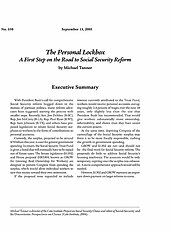With President Bush’s call for comprehensive Social Security reform bogged down in the morass of partisan politics, many reform advocates have suggested starting the process with smaller steps. Recently, Sen. Jim DeMint (R‑SC), Rep. Jim McCrery (R‑LA), Rep. Paul Ryan (R‑WI), Rep. Sam Johnson (R‑TX), and others have proposed legislation to rebate Social Security surpluses to workers in the form of contributions to personal accounts.
Currently, the surplus, projected to be around $70 billion this year, is used for general government spending. In return, the Social Security Trust Fund is given a bond that will eventually have to be repaid out of future taxes. The Senate legislation (S1302) and House proposal (HR3304, known as GROW for Growing Real Ownership for Workers) are designed to prevent Congress from spending the surplus, which would allow individual workers to save that money toward their own retirement.
If the proposal were expanded to include interest currently attributed to the Trust Fund, workers would receive personal accounts averaging roughly 3.4 percent of wages over the next 10 years, only slightly less than the size that President Bush has recommended. That would give workers substantially more ownership, inheritability, and choice than they have under the current system.
At the same time, depriving Congress of the camouflage of the Social Security surplus may force it to be more fiscally responsible, curbing the growth in government spending.
GROW and S1302 are not — and should not be — the final word for Social Security reform. The proposals do little to address Social Security’s looming insolvency. The accounts would be only temporary, expiring once the surplus was exhausted. A more comprehensive approach would still be needed.
However, S1302 and GROW represent an important down payment on larger reforms to come.

This work is licensed under a Creative Commons Attribution-NonCommercial-ShareAlike 4.0 International License.

